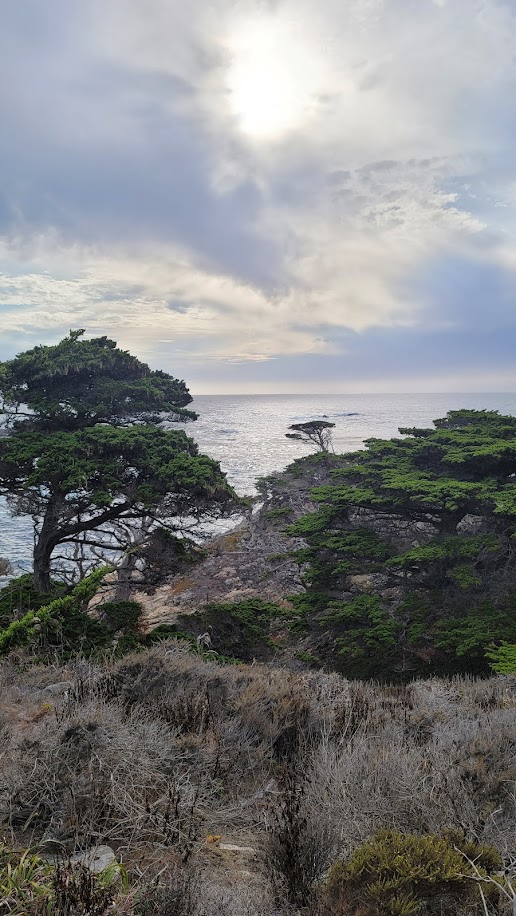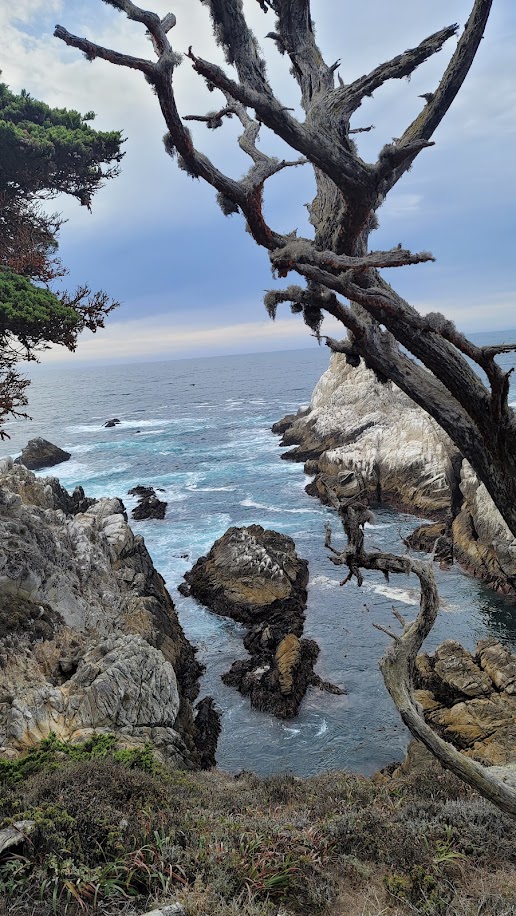In the beginning was the Word..
John 1:1
My family and I visited Point Lobos Natural Preserve in Northern California this week. We walked along seaside cliffs overlooking the ocean and saw colors, shapes, and textures that defied adjectives. The frustration was enjoying the beauty of our surroundings in real-time while also trying to capture it in both words and photos.
From behind our phones and binoculars, the best words we could conjure up were “beautiful,” “stunning,” “majestic,” and “unreal.” Looking back, those words, and our photos, are a tad disappointing because they just don’t measure up to what it felt like to be there. Words still fail me, so I’ll try to convey it to you in photos.






The Frustration with Words
My frustration got me thinking about words. Words are everywhere. We think, speak, sing, write, hear, and read words all day. Words are funny things. They are a few letters squished together that make a sound, and that sound carries meaning.
As writers, our currency is words. We seek to use them to make our readers experience something new, enlightening, or challenging. When used properly, words are the very thing God used to reveal himself to us.
Writing that Points to a Greater Reality
God revealed himself to us in two ways: creation and the Word of God (Romans 1). Creation makes us stand in awe and point to a reality greater than ourselves, just like Point Lobos. Words can do the same thing.
The Bible’s first sentence illustrates the power of God’s spoken words and his creation. “In the beginning, God created the heavens and the earth” (Genesis 1:1). Out of nothing, he spoke everything into existence. But the message of his greatness and all he wants to communicate to us doesn’t stop there.
The Bible uses hundreds of thousands of words to tell us who God is and we are. If you were to read the whole book cover to cover, you’d read 783,137 words in the King James or 757,439 in the English Standard Version. No matter how you look at it, God has much to say to us…through words!
The Ministry of Words
Christian writing is the ministry of the Word through words. We are molding and shaping words to bless, encourage, correct, teach, and train in righteousness (2 Timothy 3:16). God has a lot to say; therefore, we have ample material to work with. At the heart of this type of writing is a desire to make our readers know or feel some new reality. John Piper said, “Great writing is about great reality – clearly seen, and greatly felt.”
Wanting to write is a good thing. But for some, it’s hard to know where to start. Here are four ways to narrow down the realities of your life and start writing about it.
- Write from the overflow of your heart. Keep your heart with all vigilance, for from it flow the springs of life (Proverbs 4:23). What we put in our hearts and minds inevitably overflows from our mouths and fingertips. He has to work in our hearts before God can work through our words. We can’t give to others what we haven’t experienced. This is the Christian writer’s first and greatest task: to feast daily at the table of God’s Word.
- Write from the hard, dry places. Be authentic and write through the good and bad times with an eye toward God’s faithfulness. Moses reminded the Israelites of this truth before entering the Promised Land. “For the Lord your God has blessed you in all the work of your hands. He knows your going through this great wilderness. These forty years the Lord your God has been with you. You have lacked nothing” Deuteronomy 2:. Are you feeling dry and uninspired? God knows when you’re in the wilderness, and even then, he blesses the work of your hands!
- Write with humility to comfort others. If adversity has softened your hard edges and made you more dependent on your Savior, that is a testimony worth sharing. Not every trial needs to be published. However, the ones that you share should point your reader to the greater realities you experienced in your darkest hours. Your trials make you uniquely qualified to share the comfort you’ve received with others (2 Corinthians 1:4).
- Write to glorify God. “Whatever you do, in word or deed, do everything in the name of the Lord Jesus, giving thanks to God the Father through him” (Colossians 3:17). Who’s the star of your writing? Is it you, or is it God? Your reader can tell. Even if you have a lot of great advice, wisdom, ideas, and counsel, make it your business to make much of him. We can be like John the Baptist, who was happy to decrease so that Jesus could increase his ministry.
The Paradox of Writing
Writer friend, you have a lot to share with the world! You see things in a way no one else does, and you have valuable insights into reality other people need to see and feel. Be brave and write even if it scares you. But fair warning…inevitably you’ll be frustrated by the process. Unlike God, you’re not able to speak worlds into existence and find them to be “very good.” You’ll grapple to find the right words, and you’ll rewrite your post three or four times, and feel at the end, that it’s just ‘ok.’
The paradox of writing is that the very tools we use to point others to the infinite reality of God remind us that we are indeed finite. We’re pointing others to something that far exceeds our imaginations or limited vocabularies, and thus, the frustration.
But maybe this is the point.
Maybe words should fail us when we stand on the seaside cliff because we’re experiencing something bigger and better than ourselves. Maybe we should struggle to write about the themes of God because they are so majestic, and we are small and insignificant by comparison.
We long for a way to express what’s inside, and so we must carry on, even if we do so imperfectly and with a great deal of frustration. We want to experience more beauty, more breath-taking vistas, and more grandeur because ultimately we want heaven and we want Jesus. This is the reality we want others to see and feel, this is the reality our limited words must point to.
SDG,
Cara
P.S. All this talk of beauty and our enjoyment of it, is the reason I wrote this Holy Leisure Framework. Inside you’ll see what holy leisure is, what God’s word says about it, and how we should respond to it. It’s totally free, just plug in your email and it’s yours!


6 Responses
Words can sometimes fail us where God’s awesomeness is involved, sometimes, I rewrite post or add a little more, but most of the time it is like He is saying leave it alone.
I get that too! Thanks for stopping by Rebecca!
I really loved the correlation between capturing God in words and capturing creation in words. I never thought about those two things together and how the Bible says those are the ways God reveals himself (Romans 1). It is a comfort and at times a frustration that we can’t fully understand or explain these things in words, but I am thankful that our God is more complex than our human comprehension.
Just think about how heaven will be!
Words sometimes cant capture the beauty of somthing, or get the point across. Sometimes I feel like Iam writting the same sentence over and over again in different ways, but still not capturing what Iam trying to say. This was great one, I loved it!!
Thanks sweetie! Yes, I feel this ALL the time too. 🙂